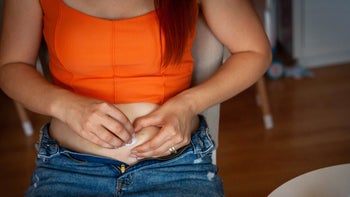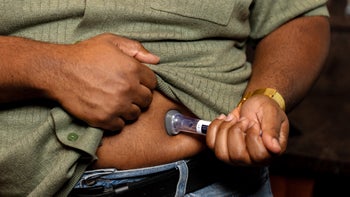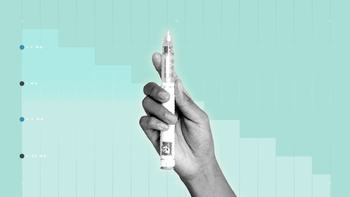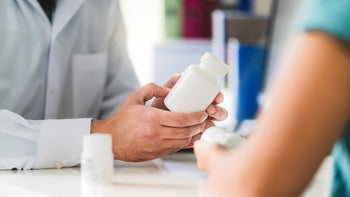
Does Alcohol Make You Gain Weight? Why Drinking Less Can Help Weight Loss
Key takeaways:
Excess calories from alcohol can lead to weight gain. People who gain fat from alcohol tend to gain it in the midsection of their body, causing an alcohol or “beer belly.”
Cutting back on alcohol intake can make it easier to lose weight.
People also find that they have fewer unhealthy food cravings when they cut back on alcohol.

Many adults in the U.S. drink alcohol. In fact, about 1 in 3 men and 1 in 5 women drink alcohol daily.
Alcohol use is one of many factors that can contribute to unwanted weight gain. People with extra weight or obesity who drink more than the recommended alcohol limits may be able to lose weight more easily when they stop drinking alcohol.
But, the relationship between alcohol intake and weight is complex. Keep reading to learn more about alcohol and weight gain below.
Save every month on GLP-1 meds with GoodRx
Save an average of $235 on FDA-approved GLP-1s like Ozempic and Zepbound.

How does alcohol cause weight gain?
Alcohol has many different effects on health. Here’s how regularly drinking alcohol contributes to weight gain.
Alcohol adds extra calories
All alcohol contains energy in the form of calories. These are “extra” calories because people don’t drink alcohol to fulfill hunger or meet nutritional needs. In other words, alcohol provides “empty” calories. When the body receives more energy than it needs (either by overeating or overdrinking), the body stores that extra energy as fat.
Alcohol slows down metabolism
Your metabolism is how your body processes food and turns it into energy. Your body uses this energy for everyday functions (like thinking and breathing), activity, and exercise.
When you drink alcohol, your body’s metabolism focuses its energy on processing and removing it. This is because alcohol is toxic to the body.
Unfortunately, while your body is preoccupied with metabolizing alcohol, it can’t effectively process food, causing metabolism to slow down.
Alcohol can cause unhealthy food choices
Even when you’re feeling your best, it can be hard to make healthy food choices. When your brain is under the influence of alcohol, your decision-making processes are affected. You may be more tempted to eat unhealthier foods and more likely to give into those temptations.
Trying to drink less alcohol? Here are strategies and hacks to reduce how much and how often you drink.
More strategies to manage your weight. Consider these evidence-based ways to lose weight.
Eat less sugar: Cutting back on how much sugar you consume can also help with weight loss — and improve your overall health.
Does beer, wine, or liquor cause more weight gain?
It depends on how much you drink. Different types of alcohol contain a different number of calories, but all can cause weight gain.
Here are some rough estimates for the calorie content of beer, wine, and liquor:
Beer: 150 calories in 12 oz
Wine: 120 calories in 5 oz
Liquor: 100 calories in 1.5 oz
Per recommended serving, liquor contains the fewest calories. But this doesn’t include the calories added by any liquids that you mix with the liquor. It’s also common for home-poured drinks and drinks served in bars and restaurants to be larger than a “standard serving.”
Does alcohol lead to more belly fat?
Alcohol excess can raise the risk of weight gain throughout the body, and in particular, in the belly. Scientists don’t fully understand how alcohol causes a “beer belly,” which is also called central obesity. But they do know this: Abdominal weight gain, in particular, is linked to a higher risk for heart disease and diabetes.
Can quitting drinking help with weight loss?
If you’re struggling to lose excess weight, quitting drinking is an effective way to improve your weight loss attempts. This is especially true if you drink regularly and/or you have more than 1 to 2 drinks when you do drink.
What are the health benefits of quitting alcohol?
Unlike food and water, alcohol is not essential to our diet. In fact, there are negative health consequences associated with drinking too much alcohol.
Significantly cutting back on alcohol — or stopping completely — has many health benefits, including:
Easier weight loss
Lowered risk for heart disease
Lowered risk of cancer
Lowered risk of liver disease
Stronger immune system
Improved sleep quality
Improved mental health
Improved energy, focus, and concentration
Improved relationships
Improvements in sexual function
How much weight can you lose by quitting alcohol?
How much weight you are able to lose by giving up alcohol will depend on several factors. These include:
How much excess weight you have
How much alcohol you typically drink
Whether you have other medical problems
Your eating habits
Your other behaviors
Let’s take, for example, a person who’s drinking 3 beers per night. An average beer contains 150 calories. By giving up the 3 beers per night, they’ll consume 450 fewer calories per day. In 1 week, they’ll consume 3,150 fewer calories.
If that person replaced their drinking time with more active pursuits, they would burn more calories throughout the week.
On the other hand, replacing the nightly beers with a nightly high-calorie dessert, would not lead to the same improvements in weight.
How long after quitting drinking can I expect to start losing weight?
Again, this depends on how much excess weight you have to lose and how much alcohol you’ve been drinking. It also depends on your other lifestyle changes, like whether you’re changing your diet or increasing your physical activity.
Someone who goes from daily alcohol drinking to stopping altogether can expect to see physical body composition changes as well as weight loss in the days or weeks after they quit drinking alcohol.
Weight-friendly alternative drinks to try
If you do want an alcoholic drink every now and then, you can make healthier and smarter choices around the drink that you choose. Here are some suggestions for lower-calorie alcoholic drinks:
Wine spritzer: Add carbonated water (like seltzer or club soda) to a partially filled glass of wine.
Light beer: There are light beer options that contain considerably fewer calories — and less alcohol — than their standard beer counterparts.
Mixed drink: If you decide to have a mixed drink, go for a mixer that’s lower in calories. For example, you can order a skinny margarita, which has less sugar than a regular margarita. Try to avoid straight juice as a mixer, as juices usually contain a lot of sugar. You can also add carbonated water to any mixed drink to dilute it further.
Frequently asked questions
Bloating from alcohol usually goes away within several days. Alcohol can cause bloating for a few reasons. If you’re having several drinks, especially pints of beer, you’re consuming a lot of liquid and calories, which will leave you feeling bloated, and may even cause you to gain a little weight. Alcohol can also cause you to retain water, which leads to feeling bloated.
Alcohol itself is low in sugar. But when you add juice or mixers to alcohol, it adds a wallop of sugar to your drinks. Liquors like vodka, rum, and tequila, are low in sugar. But mixed drinks, like an Aperol spritz, espresso martini, or piña colada can have from 15 g to 20 g of sugar. That’s equal to 4-5 tsp. Ready-to-drink alcoholic beverages also contain high amounts of sugar. Beer and wine tend to be low in sugar content, but they are not low in calories.
Probably not. Zero-proof alcohol means a drink has no alcohol or up to 0.5% alcohol. Since alcohol contains a fair amount of calories, you can reduce your caloric intake by drinking zero-proof beverages. But they’re not calorie free. Zero-proof beers, for example, contain added sugars to help improve the taste, but they still tend to have about half to two-thirds the calories of regular beer.
The bottom line
Drinking alcohol (especially drinking more than 1 to 2 drinks per day) adds extra calories to your diet, enhances food cravings, and slows down metabolism. Quitting (or cutting back) on alcohol is one effective way to lose excess weight. It can also improve the way you feel about yourself, your energy levels, and the quality of your sleep — all of which are closely tied to weight.
If you or someone you know struggles with substance use, help is available. Call the National Helpline from the Substance Abuse and Mental Health Services Administration (SAMHSA) at 1-800-662-HELP (4357) to learn about resources in your area.
Why trust our experts?



References
Action on Sugar. (n.d.). ‘Ready to drink’ alcoholic beverages.
Bendsen, N. T., et al. (2013). Is beer consumption related to measures of abdominal and general obesity? A systematic review and meta-analysis. Nutrition Reviews.
Breslow, R. A., et al. (2013). Diets of drinkers on drinking and nondrinking days: NHANES 2003-2008. The American Journal of Clinical Nutrition.
Centers for Disease Control and Prevention. (2024). About moderate alcohol use.
Dental Nursing. (2021). Sugar content of most popular cocktails revealed.
Kerr, W. C., et al. (2008). Alcohol content variation of bar and restaurant drinks in Northern California. Alcoholism, Clinical and Experimental Research.
Nielsen, S. J., et al. (2012). Calories consumed from alcoholic beverages by U.S. adults, 2007–2010. National Center for Health Statistics.
O'Donovan, G., et al. (2018). Associations between alcohol and obesity in more than 100 000 adults in England and Scotland. British Journal of Nutrition.
Snijder, M. B., et al. (2005). What aspects of body fat are particularly hazardous and how do we measure them? International Journal of Epidemiology.
Traversy, G., et al. (2015). Alcohol consumption and obesity: An update. Current Obesity Reports.

























